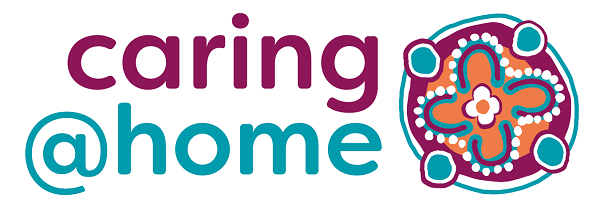caring@home for Aboriginal and Torres Strait Islander People
A blog post written by Professor Liz Reymond, Director, Metro South Health, Brisbane South Palliative Care Collaborative
Although comprehensive data on rates of Aboriginal and Torres Strait Islander people accessing palliative care services are not available in Australia, clinically it has been observed that these Australians are underrepresented in the palliative care patient population.
In addition, Aboriginal and Torres Strait Islander people are more likely to be admitted for palliative care-related hospitalisations, with the rate of admissions in public hospitals approximately double that for other Australians. [1]
These statistics are noteworthy given that many Aboriginal and Torres Strait Islander people report feeling culturally unsafe in hospitals and some (especially in remote communities) express a preference for dying ‘on country’. [2,3] In fact, the Northern Territory Government anticipates that palliative care ‘on country’ will be an area of service growth as the Aboriginal population in the Northern Territory ages. [4]
Being cared for and dying at home requires appropriate support. One of the most frequent reasons that community-based palliative patients are transferred to inpatient units is because their symptoms cannot be adequately controlled at home [5]; few patients in Australia have access to 24-hour professional care in the community.
Research literature confirms that carers receiving standardised support from health professionals, including adequate information and resources, can be taught the necessary skills to safely and effectively manage the breakthrough symptoms of a person they are caring for at home, if that is the person’s choice. [6,7]
The caring@home resources support health professionals to teach carers to safely manage breakthrough symptoms using subcutaneous medicines. Resources are applicable Australia-wide for community service providers, health professionals and carers.
These resources have been widely taken up across all States and Territories in Australia. Evaluation data indicates a positive response to resources from carers and health professionals:
‘I just think it’s an invaluable resource to make caring at home possible. To make that symptom management so much easier.’ (Carer)
‘It’s such a wonderful thing to be able to have a choice and to have options. As I said, I feel lucky to give - to be able to give your loved one an option to be at home and I think the package really will ensure that people feel supported. I mean, I think it's just been gold star. It was just the very best thing for us. I think it - I can’t say enough about it. It’s really been a magnificent thing for us.’ (Carer)
The existing caring@home resources have the potential to facilitate culturally safe end-of-life care for Aboriginal and Torres Strait Islander people who wish to be cared for, and to die, at home but they need to be tailored to meet the needs of this community.
Brisbane South Palliative Care Collaborative (BSPCC) has been funded by the Australian Government Department of Health to undertake a three-year project, caring@home for Aboriginal and Torres Strait Islander People. It will be conducted by a consortium, led by Brisbane South Palliative Care Collaborative.
The aim of the project is to improve the quality of palliative care service delivery to Aboriginal and Torres Strait Islander people by modifying existing caring@home resources to support Indigenous Australians to be cared for, and to die at home, if that is their choice.
Resources will be applicable Australia-wide for clinical services, health professionals and families to support families to help manage breakthrough symptoms safely using subcutaneous medicines.
caring@home for Aboriginal and Torres Strait Islander People will:
- Develop tailored resources for Aboriginal and Torres Strait Islander families based on extensive consultation
- Provide information and education for health professionals
- Undertake a national rollout of the resources via communication and marketing activities
- Evaluate the project.
If you would like further information about this project please contact the Project Manager, Dr Karen Cooper karen.cooper3@health.qld.gov.au.
To register for project updates go to: https://www.caringathomeproject.com.au/tabid/5177/Default.aspx
References
- Australian Institute of Health and Welfare. Palliative care services in Australia [Internet]. Canberra: Australian Institute of Health and Welfare, 2019 [cited 2019 Aug. 1].
- Palliative Care Australia (PCA). Position Statement: Improving access to quality care at the end of life for Aboriginal and Torres Strait Islander Australians (85kb pdf). Canberra: PCA; 2015.
- Willis J. Dying in country: Implications of culture in the delivery of palliative care in indigenous Australian communities. J Anthropology Med. 1999; 6(3):423-35.
- Northern Territory Government. Northern Territory Government Submission to the Productivity Commission Inquiry into Reforms to Human Services (294kb pdf). Northern Territory Government; 2017.
- Rosenberg JP, Bullen T, Maher K. Supporting Family Caregivers With Palliative Symptom Management: A Qualitative Analysis of the Provision of an Emergency Medication Kit in the Home Setting. Am J Hosp Palliat Care. 2015 Aug;32(5):484-9. doi: 10.1177/1049909114531326. Epub 2014 May 5.
- Poolman M, Roberts J, Byrne A, Perkins P, Hoare Z, Nelson A, et al. CARer-ADministration of as-needed subcutaneous medication for breakthrough symptoms in homebased dying patients (CARiAD): study protocol for a UK-based open randomised pilot trial. Trials. 2019 Feb 7;20(1):105. doi: 10.1186/s13063-019-3179-9.
- Healy S, Israel F, Charles M, Reymond L. Laycarers can confidently prepare and administer subcutaneous injections for palliative care patients at home: A randomized controlled trial. Palliat Med. 2018 Jul;32(7):1208-1215. doi: 10.1177/0269216318773878. Epub 2018 May 11. PMID: 29749803; PMCID: PMC6041737.

Professor Liz Reymond, Deputy Director, Metro South Health, Metro South Palliative Care
Director, Metro South Health, Brisbane South Palliative Care Collaborative
Director, Queensland Health, Statewide Office of Advance Care Planning
